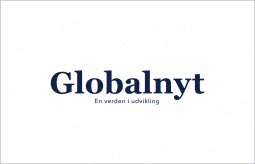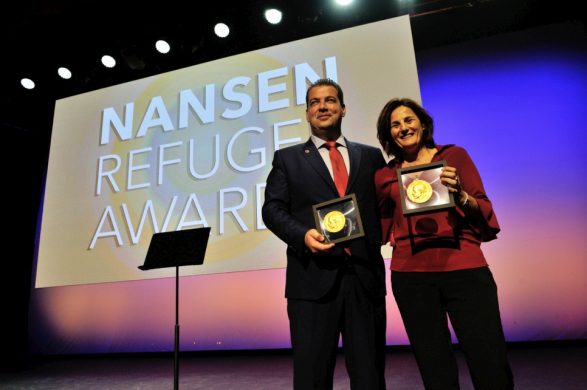Om Nansen Refugee Award

UNHCR’s Nansen Refugee Award consists of a commemorative medal, the Nansen Medal, and a 100.000 USD monetary prize, donated by the governments of Norway and Switzerland, to begin a project in consultation with UNHCR to assist the forcibly displaced.
Once a year, we honour extraordinary service to the forcibly displaced.
Few humanitarian honours possess the rich legacy of UNHCR’s Nansen Refugee Award. Established in 1954, the Nansen Refugee Award is named after Fridtjof Nansen, the first High Commissioner for Refugees for the League of Nations.
The award is bestowed to a person or group for outstanding work on behalf of the forcibly displaced. The Nansen Refugee Award, through its laureates, aims to showcase the values of perseverance and conviction in the face of adversity.
This year marks the 60th anniversary of UNHCR’s Nansen Refugee Award. Since Eleanor Roosevelt became the first winner in 1954, more than 60 individuals, groups and organizations have been recognized for outstanding and dedicated work on behalf of displaced people.
GENEVA, 3 October 2016 (UNHCR): Greek volunteers Efi Latsoudi and Konstantinos Mitragas on behalf of the Hellenic Rescue Team (HRT) tonight became the latest in a long line of distinguished everyday heroes to receive UNHCR’s prestigious annual Nansen Refugee Award.
Both winners of the UN Refugee Agency’s humanitarian prize helped thousands of refugees arriving on Greek shores during the 2015 refugee and migrant crisis – saving lives during treacherous sea crossings and providing a safe haven for the most vulnerable after they reached land.
The award recognizes Latsoudi and the HRT’s work and that of all volunteers in Greece and Europe in 2015, when Europe faced its biggest refugee crisis in decades, as over one million people arrived during the year. Over 850,000 people reached Greece by sea, with more than 500,000 of these arriving on the island of Lesvos alone.
“This award is a recognition of a conscious decision not to deny to vulnerable human beings that arrived in Lesvos, and to those who did not make it, their dignity,” Latsoudi said, after she accepted the Nansen medal from UN High Commissioner for Refugees Filippo Grandi at a ceremony in central Geneva on Monday evening (October 3 2016). “All that we have achieved with solidarity, we need to defend it now.”
En helle for flygtningebørn
Latsoudi is one of the founders of PIKPA village on Lesvos. Formerly a children’s summer camp, it was transformed in 2012 with the help of local authorities into a safe haven for vulnerable refugees. By the 2015 crisis, PIKPA was hosting around 600 refugees a day, despite a capacity of just 150. In the past four years, PIKPA village has helped over 30,000 refugees.
Mitragas leads a team of more than 2,000 HRT volunteers, who have been rescuing people from the Aegean Sea and Greek mountains since 1978. In 2015, the volunteers worked 24-hour days, responding to endless rescue calls in the middle of the night. During this time they undertook 1,035 rescue operations, saving 2,500 lives, and assisted more than 7,000 people to safety.
“From the first time we saw human beings in extreme danger, for us there was no second thought, we just helped them,” Mitragas said, accepting the award on behand of 2,000 HRT volunteers.
“We never sought recognition. We are truly satisfied just with the smile of the rescued person, this is our reward.”
Mange små handlinger kan blive til noget stort
Presenting the medal, Grandi, said the heroic humanitarian efforts of the two winners “reflect the spirit of solidarity which transcends intolerance and focusses on saving lives, healing hearts and calming souls.”
“This is home-grown generosity: the accumulation of simple acts and it can be so powerful. And this is what motivates our two winners, who know first-hand that simple acts of humanity can add up to something miraculous.”
For the first time, the ceremony was hosted by an Arabic speaker, the Lebanese TV personality Neshan, and featured a keynote speech by the BBC’s highly regarded chief international correspondent, Lyse Doucet.
In an emotional speech which drew tears from the audience, Doucet said: “‘Home’ is there any sweeter word in the dictionary of emotion? … Tonight we celebrate the biggest of hearts – hearts which are heroic.”
Senegalese singer Baaba Maal provided music at the ceremony, at which 2015 World Poetry Slam Champion Emi Mahmoud performed her moving poem Bird Watching on Lesvos Island. Also performing were The Grey People, a dance troupe who moved the audience at this year’s Eurovision Song contest with a performance about the current refugee crisis.
Latsoudi and the HRT join previous winners of the award, including a Japanese optometrist, Akio Kanai, who has given sight to thousands, and Congolese nun Sister Angélique Namaika, who helped women abused and forced to flee by the Lord’s Resistance Army
Last year, Afghan schoolteacher Aqeela Asifi received the award for her dedicated work helping more than 1,000 refugee girls complete their primary education in Pakistan.















